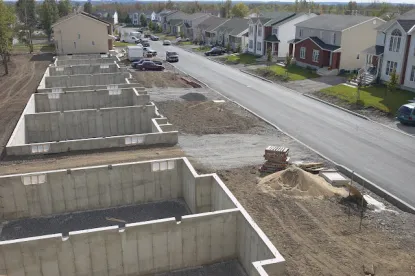Last week, the Colorado Court of Appeals issued an opinion recognizing for the first time that a master developer may be liable to a subsequent home purchaser under an implied warranty of suitability. Rogers v. Forest City Stapleton, Inc., 2015COA167.
Land developers in Colorado should take note of this case because it creates new liability for claims for implied warranties from parties with whom the land developers have no contractual relationship. Polsinelli will continue to watch this case, and any possible appeal to the Colorado Supreme Court, which may have interest in reviewing the new legal standard announced based on law from other jurisdictions and the two different dissents.
Background
Forest City Stapleton is the master developer of Stapleton, a redevelopment of the old Stapleton Airport into a mixed-use community with about 12,000 residences. Forest City subdivided some 4,700 acres of land into lots, formed Park Creek Metropolitan District for purposes of installation of infrastructure to serve those lots, and sold residential lots to homebuilders. The homebuilders build homes on those lots and sell them to homeowners. As part of its work at Stapleton, Forest City did no actual construction. However, it selected builders, exercised control over the architecture and design of homes, and acted as the construction manager for Park Creek Metropolitan District’s infrastructure projects.
One of the homebuilders at Stapleton sold a lot with a completed home to the plaintiff Tad Rogers. Rogers paid a premium for a deeper basement that could be later finished with higher ceiling heights. Once the home was complete, and Rogers had closed on his purchase and moved into the home, he learned that the ground water level on his lot was too high for the intended basement build-out.
Rogers sued Forest City under a theory of implied warranty of suitability – even though Forest City did not build the house or even sell the lot to Rogers. Rogers claimed that Forest City implicitly warranted that the lot would be suitable for construction of a house with a basement suitable for finishing. Rogers also made a claim against Forest City for nuisance, based on the use of recycled concrete aggregate base course (RCABC) to build roads in the neighborhood. The use of RCABC allegedly caused clogging of perimeter drains on Rogers’s lot which exacerbated the water issue. The roads were constructed by Park Creek Metropolitan District, but Rogers argued that Forest City effectively controlled Park Creek Metropolitan District and acted as construction manager. Therefore, Forest City was liable for the nuisance caused by the use of RCABC. The case went to trial, with extensive expert testimony, and the jury sided with Rogers on both claims.
Relying on prior related Colorado case law, as well as case law from other jurisdictions, a divided Court of Appeals held that an implied warranty of suitability exists between a developer of a vacant lot and the owner of a home constructed on that lot (even if that owner is not the first purchaser) if:
The developer improves the lot for a particular purpose, and
All subsequent purchasers rely on the developer’s skill or expertise in improving the lot for that purpose.
The Court also held that the jury in this case had been improperly instructed on the implied warranty claim and remanded for a new trial. With respect to the nuisance claim, the Court of Appeals found in favor of Forest City, recognizing that Forest City was separate from Park Creek Metropolitan District and therefore not liable for any nuisance caused by Park Creek Metropolitan District’s use of RCABC for road construction.
There were two dissents – one on each issue. In the first dissent related to the implied warranty claim, the dissenting judge would have reversed the trial court judgment in favor of Rogers because:
Rogers was not the first purchaser of the lot.
Rogers did not rely on Forest City’s expertise.
The lot at issue was generally suitable for the purpose of residential construction.
In the second dissent, the judge wrote that Forest City exerted enough control over Park Creek Metropolitan District and the construction process that Forest City should be liable for the nuisance.






 />i
/>i

